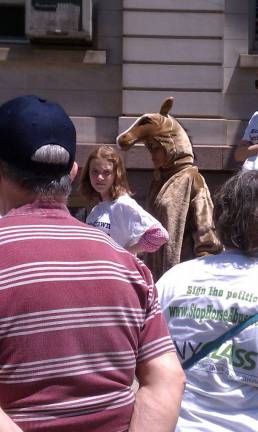Are Horse Drawn Carriages Coming to an End?

They came from all walks of life, some in heavy horse suits despite midday June weather, to descend on the steps of City Hall and rally for an end to New York City's horse-drawn carriages. (by Alissa Fleck) They are New Yorkers for Clean, Livable & Safe Streets (NYCLASS), as well as community members and advocacy groups, who think the city's horse-drawn carriages are archaic and harmful all across the board. Diane Moss, a native New Yorker who is not affiliated with NYCLASS but gives money to PETA, is appalled no one seems to be paying attention. "I have hated horse-drawn carriages since I was conscious," said Moss. "We need someone in the White House who cares about animal rights." For now, advocacy groups like NYCLASS are focusing more locally. PETA Representative Emily McCoy, NYCLASS Executive Director Carly Knudson, and Public Advocate Bill de Blasio alternately took the stand Friday to discuss the issue: "One third of the city's horses are cycled out yearly and 70 out of 200 horses disappear," said McCoy. "Accidents are a frequent occurrence." One sign held by a rally participant clarified: "10 Accidents in 10 Months." "That says enough," said de Blasio of the sign. McCoy added that the horses are treated inhumanely once cycled out; many are slaughtered post-retirement. NYCLASS discussed its solution to the problem of animal cruelty: the eco-friendly electric vintage-replica car. Introduced into legislation by Council Member Melissa Mark-Viverito under Intro 86A, the fleet of cars would create jobs, increase the industry's income and allow for more work days in addition to being safer and cleaner, explained Knudson. The substitution would also happen at no cost to the city. NYCLASS proposes a prototype pilot program before implementing the car, which would be funded entirely by NCLASS. Currently "employed" horses would be humanely retired by The American Society for the Prevention of Cruelty to Animals (ASPCA). The speakers condemned Mayor Bloomberg and City Council Speaker Christine Quinn for sidestepping the issue. According to de Blasio, Bloomberg fears the repercussions for tourism if horse-drawn carriages-the supposed epicenter of NYC touristic appeal, joked de Blasio in his own words-are banned. When asked what other options are being explored, Knudson told NY Press her group was only currently considering the electric vintage-replica car. She said other bills propose an outright ban, but her group acknowledges the economic necessity of finding an alternative to the carriages. Moss agreed with this assessment. Asked her thoughts on the replica car, she told NY Press: "I don't know anything about the car, but it's offering an alternative. [Carriage drivers] only know this trade." Following her comments, Moss donned a NYCLASS t-shirt, grabbed a sign and joined the rally. NY Press took to the streets surrounding Central Park, where these horse-drawn carriages are most prevalent, to find out if the end of the carriages means the decline of romance (or at least tourism as Bloomberg proposes). One semi-retired carriage driver, who would not give his name, has been driving carriages in the park on and off for thirty years. He said there have been proposals like this one for years, and Central Park will simply never allow it. When asked why, he told the Press: "It just goes against the characteristics of the park. "This is an animal rights Trojan Horse," he said. "They just want access to the horse stables." The carriage driver was sitting in a horse carriage at the time, but when asked the horse's name, he replied he did not know. When asked if he thought replacing carriages with vintage-replica cars might hurt tourism, he conceded there are enough touristic activities in New York for it not to have an effect. He also added if, hypothetically, the replacement happened, he would not drive one of the cars. When asked if a vintage car could be as romantic as a horse-drawn carriage, he said: "It's not about the romantic aspect. The park was designed for carriages. It was a demonstration area for carriages to show off in the horse-drawn era." Four other carriage drivers declined to talk to the Press. Many tourists enjoying Central Park on a Friday evening hardly seemed interested in the carriages. When asked if he would ever ride in a horse-drawn carriage, Lee Sang Yun, who was visiting New York City with a friend, said: "No. There's no time. We like to walk." The Ramajos, a French couple enjoying ice cream cones on a park bench, had similar feelings. "No, we don't want to take a horse-drawn carriage," said Mrs. Ramajo. "We want to walk," said her husband. Regardless of the carriage driver's dismissal of this proposal, according to NYCLASS, 85,000 New Yorkers support the Vintage-Replica Car Trial, and Knudson says they will not stop fighting until horse-drawn carriages in the city are a thing of the past.